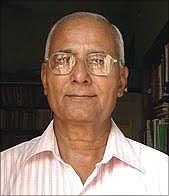 | « Back to article | Print this article |
 The police investigations into the Ajmer and Mecca Masjid blast cases have floundered. The investigation went in one direction blaming the Harkat-ul-Jihadi for two years and now it is going in another direction where the Abhinav Bharat and the Sanathan Sanstha are being blamed. Several persons have often wondered why the police bungled this probe so badly that the courts had to release all those who were arrested initially and in some cases even ordered the state to pay compensation.
The police investigations into the Ajmer and Mecca Masjid blast cases have floundered. The investigation went in one direction blaming the Harkat-ul-Jihadi for two years and now it is going in another direction where the Abhinav Bharat and the Sanathan Sanstha are being blamed. Several persons have often wondered why the police bungled this probe so badly that the courts had to release all those who were arrested initially and in some cases even ordered the state to pay compensation.
S R Darapuri, a retired Indian Police Service officer has been fighting for several innocents picked up and tortured by the police in several cases of terrorism, including the Ajmer case. "Being a part of the establishment for 25 years, I fail to understand how the police can go so horribly wrong. The problem is that a majority of the force has a communal bias towards the minorities," the former top cop says.
In this interview with rediff.com, Darapauri explains how the police force is beset with bias and what needs to be done to tackle it.
What are your views on the shift in investigations into both the Ajmer and Mecca Masjid blasts case?
From day one, there was something fishy about the manner in which the investigations were being conducted. It looked like a complete frame up from the start. Many of us wondered why Muslims would blowing up their own shrines? Something did not add up from the beginning.
Are you saying that the same outfits carried out these blasts?
The Ajmer, Mecca Masjid, Malegaon and Goa blasts are all interlinked. I strongly suspect the role of Abhinav Bharat and the Sanathan Sanstha in these incidents.The uncanny resemblance in all these cases will tell you the story.
Do you believe that the police is on the right track now?
It looks fine at the moment. However, the biggest victory would be when innocents stop getting implicated in such cases. We must all thank (former Mumbai Anti-Terrorism Squad chief) Hemant Karkare who blew the lid off this phenomenon. The police were under the impression that it was the Muslims who were involved in all cases of terrorism. However Karkare exposed them. As a non-Muslim, I would like to say that while Muslim terror groups may carry out blasts in market places or other spots, they would never attack a mosque.
The police are largely to blame in such cases. They pick up the wrong persons and give a completely different spin to the case. Why does this happen?
There is a communal bias in the police department. I have seen that majority of the officers have a communal bias towards the minorities. This practice has been going on for a while now and no attempt has been made to stop this. Moreover there is no action against those police personnel who book innocent people in wrong cases. What has happened in Hyderabad? So many people were let off by the court. The police who booked the cases for reasons best known to them continue to remain unpunished.
What should be done to change this mindset of the police?
First the police should stop chanting the mantra 'Every Muslim is not a terrorist, but every terrorist is a Muslim.' This generalisation needs to stop. Even at the training level, police officers should be instilled with the correct mindset.
At the lower rung it gets worse and each one is affected by personal prejiduces which ultimately affects investigations.
Is there any kind of political pressure to act in a particular manner?
Yes, political pressure does exist. In many cases police officers have acted on political pressure and this kind of malice among them has affected all ranks of the force. There is a need to change the composition of the police force and ensure that they work more for the society. Today the police appear to be working towards nurturing their own personal prejudices.
What about the influence of the Rashtriya Swayamsevak Sangh in the force?
The RSS has been infiltrating the force and also the administration for a long time. You speak of changing attitudes of the police with the change in government. However that makes no difference due to this infiltration. They pretty much control a large part of the system.